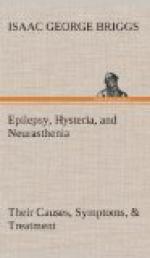are the commonest exciting causes of neurasthenia; hard brain-work, unless accompanied by worry, not being injurious.
The disease is more common in men than women (because of the more active part played by them in the struggle for existence), in cities than in the country, in mental than in manual workers, in the “idle rich”, and in races which live feverishly, like the Americans. It is rare in old age.
Ambition, the race for “success”, the struggle to carry out projects beyond the reasonable capacity of one man, and the ceaseless work and worry with little sleep and no real rest which mark life to-day are responsible for this disease.
Competition has increased in all conditions of life; free course is given to ambition, individuals impose on their brains a work beyond their strength; and then comes care and perhaps reverse of fortune; and the nervous system, under the wear and tear of incessant excitation, at last becomes exhausted,
The basic symptom is an inability to stand a normal amount of mental or physical strain, and shows itself in seven marked ways:
1. Muscular Fatigue, which is often most marked in the morning. The patient rises reluctantly, feeling as if he had not slept, is listless and “lazy”, and can neither work nor play much without getting unduly tired. This weariness may pass off as the day wears on.
2. Backache is often constant and annoying. It may be a pain, or a general discomfort, and may be felt anywhere in the back, the nape of the neck and down the spine being common places. The legs often “give way”, and, in severe cases, patients believe they cannot stand, and become bed-ridden. Under sudden excitement they may walk again, becoming “miracles of healing”. These spinal symptoms are common in neurasthenia following accident.
3. Headache is more often an abnormal sensation than an intense pain. Pulsations, feelings of distress, of lightness, fullness, heaviness and pressure are common, or a band may seem to be drawn tightly round the head across the forehead.
The sensations are usually located in the back of the head, and may be accompanied by dizziness, noises in the ears, or dimness of sight. There may be a feeling of unsteadiness when walking, or a sense of being in motion when at rest. The headache varies in intensity; it is worst in the morning, is increased by thinking, diminished after eating, often improves at night, and never keeps the patient awake.
4. Stomach and Bowel Disorders. The victim is indifferent to food, though dainties often tempt him, when he cannot face a square meal. He has a feeling of general well-being after a meal, but within an hour signs of imperfect digestion arise; he feels oppressed, and has flatulence. Later, there are flushes of heat, palpitation, drowsiness, and a craving for food. Constipation is usually obstinate, while diarrhoea may cause great weakness.




